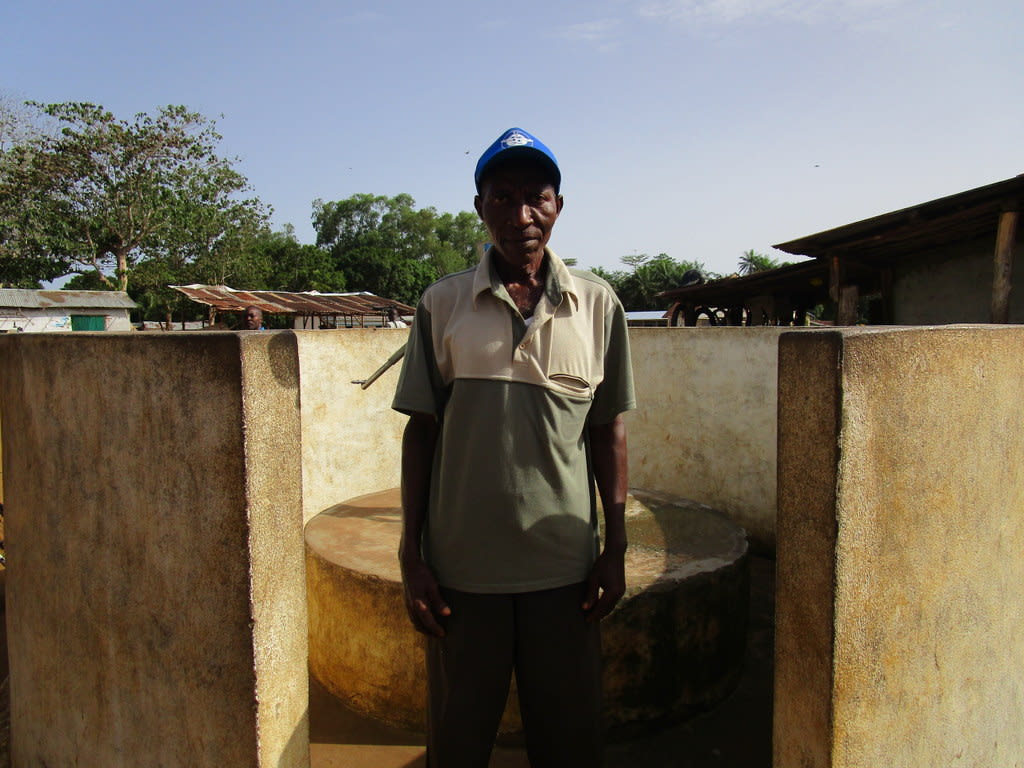Welcome to the Community
Pefifu Junction, a community that is home to approximately 220 inhabitants, was founded in the ‘40s. It was established by four men, who did so through a series of building projects. The Petifu Junction (translation: new town intersection) is home to some of the most prominent people of Sierra Leone. Despite this, its rate of illiteracy is the highest in the nation. Lokomasama – the land of the Lokos — is the third largest chiefdom in the country. This territory was controlled by the Loko tribe for decades until being overtaken by the rising Temnes – a warring tribe of traders. Since then, the Junction has become the business center of the chiefdom. Today, most of its inhabitants survive on inconsequential trading. There are, however, a handful of people fortunate enough to sustain their livelihood through farming.
Additionally, while the community is predominantly Muslim, the Christian faith has been highly influential on the community.
Water Situation
A protected hand-dug well is the community’s primary water source. Since this pump is located at the main intersection of the busiest village of Lokomasama Chiefdom, it is easily accessed by hundred coming from all four roads. Based on our quarterly visits to the community, we found out that at certain times of the year the well goes dry for months at a time. With this large population, if there is not water accessible it is a recipe for disease transmission.
When the well is dry, members of the community have to walk to the bottom of a hill to fetch water. Children are designated with this responsibility, so they must get up two hours early to fetch water for the whole day. This water is gathered in a lidless, plastic container. The steep climb necessitates multiple trips, due to difficulty in transporting large containers of water. Containers are cleaned only when there is access to soap. The water is fetched for three primary purposes: drinking, cooking, and domestic usage. The drinking water is stored with in a covered container on top of a table; the cooking water is stored in open containers, placed near the kitchen; while the water for domestic usage is left outside where animals are given free access.
Dirt and garbage have contaminated the spring pooling at the bottom of the hill. The contamination creates the potential for a multitude of diseases. The water is not treated well during the fetching, transportation, and storage processes, further contributing to contamination. Its effects are prominent among children, who have been routinely infected with worms. Cases of Typhoid, Diarrhea, and Malaria are a constant at the local health center.
Sanitation and Hygiene Situation
More than half of the population does not have access to latrines; while those that have access use pit latrines, which are often unsanitary. Since the community is host to one of the largest collections of traders throughout the country, the more domestic population has limited access to resources. Limited access to latrines in combination with a large population means that open defecation is a continual problem. (Editor’s Note: Open defecation — the practice of disposing human feces in the fields, forests, bushes, and open bodies of water — is an issue the community could potentially be facing.) High rates of open defecation leads to unsanitary conditions within the community, and can eventually degrade community health. All trash is thrown into a hole and burned at the end of each day. Because of the conditions described above, in order to eradicate potential contaminants, it’s crucial to educate and advocate regarding the importance of sanitation.
Plans: Sanitation and Hygiene Training
Training will last for three hours a day for three days. The facilitators have already assessed sanitation here and decided that hand-washing and using the latrine will be strongly emphasized. Though quite a few hand-washing stations were observed during our initial visit, we require that each and every family have their own place to wash their hands. During our hand-washing sessions, community members will be taught how to make their own hand-washing station out of a plastic jerrycan, sticks, and rope. These are the best solution for rural areas, since all the materials are all easily replaceable. Though pit latrines in this community are well-built, we also require that every family have their own.
Training will also result in the formation of a water user committee that will take responsibility for their new well. The members will manage and maintain the pump to the best of their ability, and will call our office if they need a mechanic to make a repair.
Plans: Well Rehabilitation
The well marked for this overhaul needs major work to supply adequate, clean water to the community once again. The pump will be removed, and a man will be lowered inside with a hand auger. This hand auger will allow the team to drill several meters deeper to hit a new water table, which will ensure the well supplies water throughout the drier seasons. As the team drills, casing will be installed, transforming this hand-dug well into a pseudo-borehole. PVC piping will connect this lower system directly to the pump, a construction that we know will also improve the quality of water.
Once this plan is implemented, everyone within the community will have access to safe drinking water in both quality and quantity. No more having to resort to dirty surface water during the dry season! We want this community to have a reliable source throughout the year.

 Protected Dug Well
Protected Dug Well






















